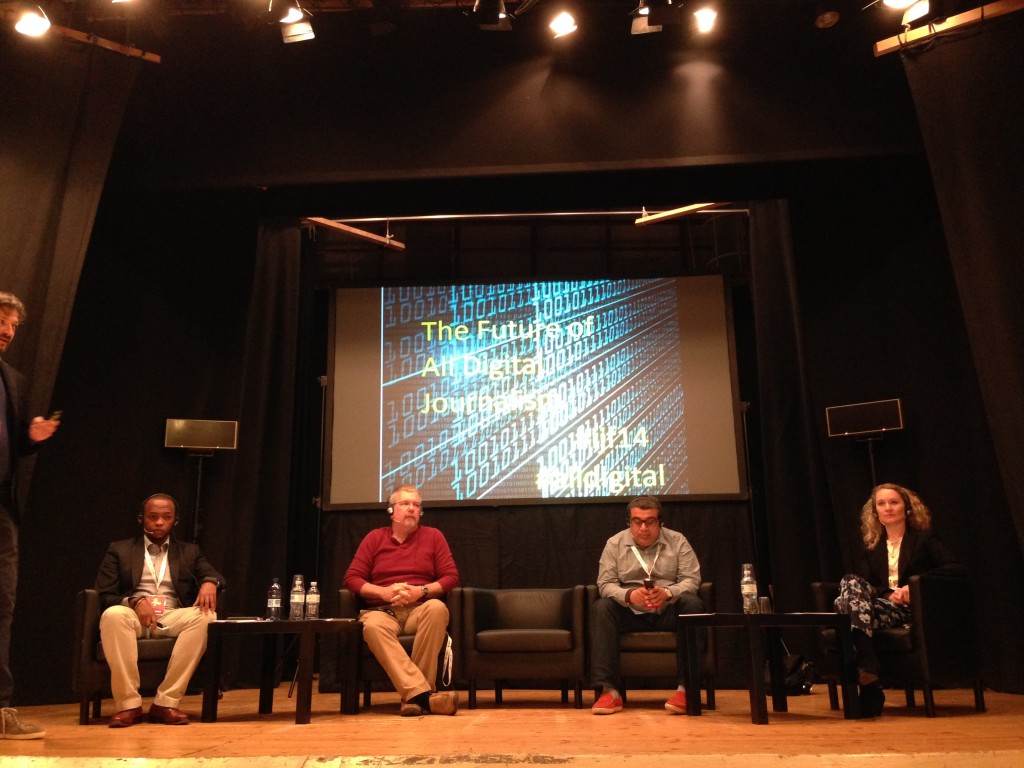
Digital journalism has created many opportunities to cover topics and establish niche websites. This is something that could not have happened back when traditional media dominated the market. At ‘The Future of All-digital Journalism (part II)’ panel discussion at the International Journalism Festival 2014, the industry’s top professionals from around the world shared their success stories.
Even though Laura Amico, founder of Homicide Watch DC; Andy Carvin of First Look Media; Andrea Iannuzzi, editor at AGL; and Mark Kaigwa, founder of Nendo, all use digital journalism to achieve their unique goals, they managed to analyze why their online projects were a hit in the digital journalism era.
We spoke to Mark Kaigwa, the founder of Nendo, a rapidly growing digital storytelling and social media strategy agency for Africa.
Q: How do you see all-digital journalism and how do you define it?
I define all-digital journalism as the age where devices, content and users, probably not in that particular order – they all disrupt the traditional one-way system that we have come to know as journalism itself. So the institution of journalism adapts to these three things. Now, in emerging markets it’s more of an evolution, not a revolution. Here’s it’s a revolution: we’ve seen newspapers fail, we’ve seen companies that have been around for decades go under. But for example in Nairobi we have opened up two brand new newspapers last year. They were new newspapers from existing media houses but it’s a sign! It’s a sign that print isn’t dead. Will it die? It could, but in emerging markets they definetly have more time on their hands to embrace digital journalism, to embrace some of the ideas happening in the US right now. We could write the next chapter in history of journalism. And I really believe it will come from Asia, Africa or Latin America.
Q: What does the all-digital journalism mean for journalists and what does it mean for publishers?
I feel that for journalists the practice of journalism stays the same. What we adapt is the institution, the systems, the processes, the work flow of a story, the practice of good reporting, the driven stories… For publishers, on the other hand, this is the toughest part because having made money in a very traditional way, they need to be more open to involving users to a higher level of risk. The publishers’ appetite for this must change! Typically it has been a ‘bread and butter’ kind of situation for them, very predictable and steady. They can survive only if they change their mindset and the actual approach in philosophy.
Q: What about citizen journalism? How does that fit into the new system?
I think that citizen journalism is not just a part of the system, it’s part of the DNA. It’s part of what changes the institution. I believe that they are the ones in control now. That means their behaviour and their response now is as important as the actual publication that was presented to them in the first place. It’s almost safe to say that what we call ‘citizen journalism’ today, in a few years will just be called ‘journalism.’ Because it [won’t] matter.
Q: How does blogging fit into all-digital journalism? Do you think bloggers should have the same professional rights as actual journalists?
I think they should enjoy the liberty that comes with Internet access, with the freedom to publish, with freedom of information and, most importantly, with freedom of expression. Because basically journalists sit in an institition which is guided on principles, on ethics around disclosure, on editorial policies and style guides. But I will always defer to the side of liberty. That’s why I hope blogging becomes even more accessible, even more encouraged. Because the second when citizens become a part of journalism, that changes things. That’s one of the reasons blogging excites me now. I’ve been running a blog for a long time as well. And I have no intention of stopping.
Q: What tendencies exist in the all-digital journalism now and what tendencies can you predict for it in the future?
I think the tendency now is doing control experiments, whereas what I want to see is a greater appetite for risk in the future. If we go to Latin America, we will see people doing it in a hybrid way, not like in the United States. My hope is that in Africa, Latin America and in Asia it will now be the era of hybrid news domination. It’s risky, it might not work, but we are committed to see it through because this is where history is taking us.
By Lillie Mazitova
Mark Kaigwa. Always very insightful. I totally agree